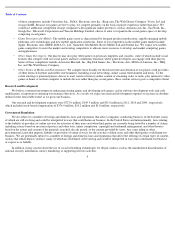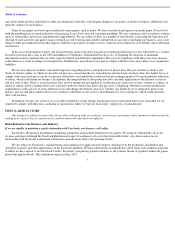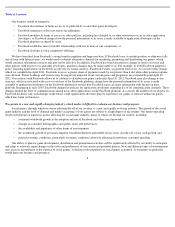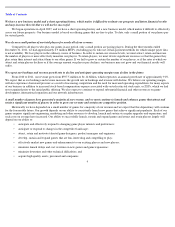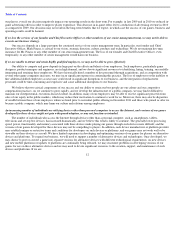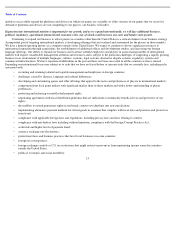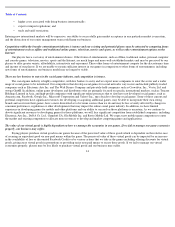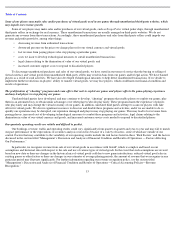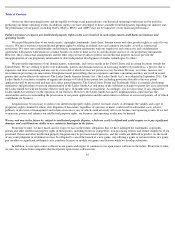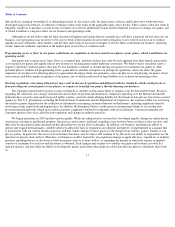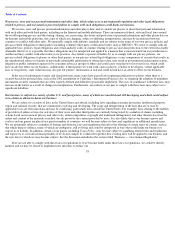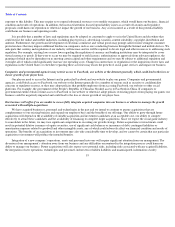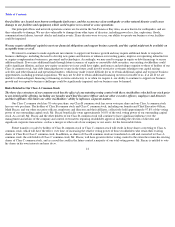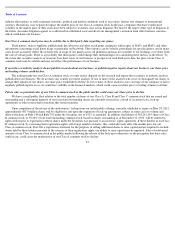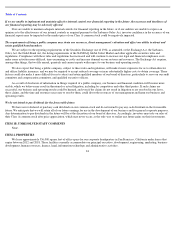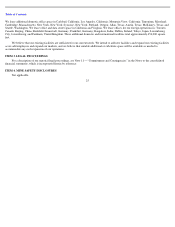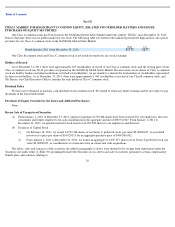Zynga 2011 Annual Report Download - page 20
Download and view the complete annual report
Please find page 20 of the 2011 Zynga annual report below. You can navigate through the pages in the report by either clicking on the pages listed below, or by using the keyword search tool below to find specific information within the annual report.
Table of Contents
Given our short operating history and the rapidly evolving social game industry, our historical operating results may not be useful in
predicting our future operating results. In addition, metrics we have developed or those available from third parties regarding our industry and
the performance of our games, including DAUs, MAUs, MUUs and ABPU may not be indicative of our financial performance.
Failure to protect or enforce our intellectual property rights or the costs involved in such enforcement could harm our business and
operating results.
We regard the protection of our trade secrets, copyrights, trademarks, trade dress, domain names and other product rights as critical to our
success. We strive to protect our intellectual property rights by relying on federal, state and common law rights, as well as contractual
restrictions. We enter into confidentiality and invention assignment agreements with our employees and contractors and confidentiality
agreements with parties with whom we conduct business in order to limit access to, and disclosure and use of, our proprietary information.
However, these contractual arrangements and the other steps we have taken to protect our intellectual property may not prevent the
misappropriation of our proprietary information or deter independent development of similar technologies by others.
We pursue the registration of our domain names, trademarks, and service marks in the United States and in certain locations outside the
United States. We are seeking to protect our trademarks, patents and domain names in an increasing number of jurisdictions, a process that is
expensive and time-consuming and may not be successful or which we may not pursue in every location. We may, over time, increase our
investment in protecting our innovations through increased patent filings that are expensive and time-consuming and may not result in issued
patents that can be effectively enforced. The Leahy-Smith America Invents Act (“the Leahy-Smith Act”), was adopted in September 2011. The
Leahy-Smith Act includes a number of significant changes to United States patent law, including provisions that affect the way patent
applications will be prosecuted and may also affect patent litigation. The United States Patent and Trademark Office is currently developing
regulations and procedures to govern administration of the Leahy-Smith Act, and many of the substantive changes to patent law associated with
the Leahy-Smith Act will not become effective until up to 18 months after its enactment. Accordingly, it is not clear what, if any, impact the
Leahy-Smith Act will have on the operation of our business. However, the Leahy-Smith Act and its implementation could increase the
uncertainties and costs surrounding the prosecution of our patent applications and the enforcement or defense of our issued patents, all of which
could harm our business.
Litigation may be necessary to enforce our intellectual property rights, protect our trade secrets or determine the validity and scope of
proprietary rights claimed by others. Any litigation of this nature, regardless of outcome or merit, could result in substantial costs, adverse
publicity or diversion of management and technical resources, any of which could adversely affect our business and operating results. If we fail
to maintain, protect and enhance our intellectual property rights, our business and operating results may be harmed.
We are, and may in the future be, subject to intellectual property disputes, which are costly to defend and could require us to pay significant
damages and could limit our ability to use certain technologies in the future.
From time to time, we have faced, and we expect to face in the future, allegations that we have infringed the trademarks, copyrights,
patents and other intellectual property rights of third parties, including from our competitors, non-
practicing entities and former employers of our
personnel. Patent and other intellectual property litigation may be protracted and expensive, and the results are difficult to predict. As the result
of any court judgment or settlement we may be obligated to cancel the launch of a new game, stop offering a game or certain features of a game,
pay royalties or significant settlement costs, purchase licenses or modify our games and features while we develop substitutes.
In addition, we use open source software in our games and expect to continue to use open source software in the future. From time to time,
we may face claims from companies that incorporate open source software into
16


